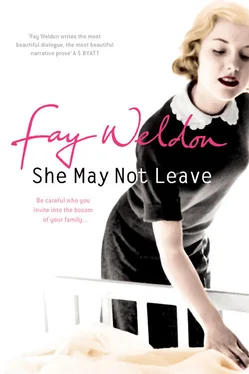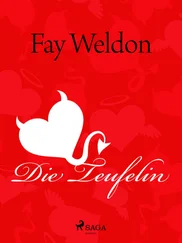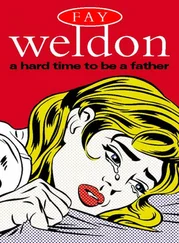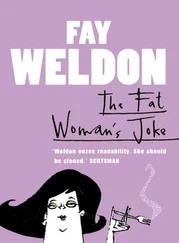She May Not Leave
Fay Weldon
Cover Page
Title Page She May Not Leave Fay Weldon
Martyn And Hattie Have Employed An Au Pair
Frances Presents Some Authorial Background
A Bit Iffy
Demotic Credentials
Sebastian In Prison
A Further Ethical Discussion After Supper
To The Left!
Acceptance
Agnieszka Comes Into Hattie’s Home
Frances Worries About Her Grand-daughter
The Effects Of Bricks And Mortar On Lives
Learned Characteristics
Martyn On The Way Home From Work
Martyn Comes Home To Agnieszka
Au Pairs We Have Known
Glossing Over Inconvenient Facts
Child Support
Martyn And Hattie Have A Tiff
Men, Women, Art, And Employment
George And Serena’s Household
Hattie At Work
A Good Au Pair And The Promise Of Life After Death
Preserving The Peace Of The Home
Dream On
Martyn Is Alone With Agnieszka
Another Country
Agnieszka And Martyn Go Shopping
Ordinary Women
Chocolate-Covered Prunes
Coming Over
Suspicions
Frances In Love
Agnieszka’s Passport
Animals
The Christening
Hurrying Men Away
The Boss Comes To Dinner
Cooking Disasters
Agnieszka And The Internet
Maternal Panics
Churchyard Drama
Mad Plans
Martyn Confesses
Hattie At The Cattery
Hattie Gets Promotion
Two Weddings And A Funeral
Martyn And Agnieszka In Bed
Two More Nights
Other Books By
Copyright
About The Publisher
Martyn And Hattie Have Employed An Au Pair
‘Agnieszka?’ asks Martyn. ‘Isn’t that far too long a name? If she wants to get on in this country she’ll have to shorten it. People are just not familiar with sshzk .’
‘But she won’t want to shorten it,’ says Hattie. ‘People have their pride, and a loyalty to the parents who named them.’ ‘If we pay her,’ says Martyn, ‘she may have to do more or less as we ask.’
Martyn is in conversation with Hattie in their economical, comfortable first-time-buyers’ house in London’s Kentish Town. Both are in their early thirties, handsome, healthy and educated, and for reasons of principle not lack of affection are not married but partnered. Baby Kitty, twenty-four weeks old, sleeps in her cot in the bedroom: Martyn and Hattie fear that she may not sleep for long. Martyn is just back from work. Hattie is ironing: she is unused to the task, and making a rotten job of it but she is, as ever, doing her best.
Hattie is my grandchild. I spent many years bringing her up and I am fond of her.
They have been talking about the possibility of employing an au pair, Agnieszka, recommended by Babs, a colleague of Hattie’s at Dinton & Seltz, Literary Agents. Hattie took maternity leave: now she wants to return to work, but Martyn is resistant. Not that he says so, but Hattie can tell because of his feeling that the girl’s name is too long. About Agnieszka they know very little, except that she has worked for Babs’s sister, the one with triplets, and left with good references.
In the circles in which Martyn and Hattie move as many babies are implanted as conceived, and so do often arrive in twos or threes. Kitty was an accident which served, after initial confusion and dismay, to make her the more precious to her parents. Fate had intervened, they felt, for the good. Man proposes, God disposes, and for once the result was satisfactory.
‘I don’t think it would be right to ask her to change her name on our account,’ says Hattie. ‘She might be offended.’ ‘I am not sure,’ says Martyn, ‘that we should define right as what does not offend.’
‘I don’t see why not,’ says Hattie. Her brow darkens as she comes to grips with what Martyn has just said. Surely not offending other people has a large part to play in what is defined as ‘right’? But since Kitty’s birth she is less sure than before about what is right and what is wrong. Her moral confidence is being eroded.
She can see it is ‘wrong’ to jam a comforter in baby Kitty’s mouth to stop the crying, as poorly educated mothers from the housing estates do. ‘Right’ would be searching for the cause of the crying and attending to that. If this is the case she chooses wrong over right at least five times a day. She can see she is also guilty of élitism, in not wanting to be numbered as one of the estate mothers. The family income may be currently below the national average, but even so the notion of her own superiority increasingly flits across her mind. Does she not read books about child-care, instead of waiting two weeks for the health visitor to turn up? Surely she is someone who controls her own destiny? But she has been so a-mush lately, so driven by hormonally based emotions, so much a prey to unaccustomed resentments and gratifications that she swings from conviction to doubt within minutes. She did wake this morning, leaning over to the crib beside the marital bed to put the comforter in Kitty’s mouth, with the comforting understanding that people are as moral as they can afford to be, no more nor less. She should not blame herself too much.
‘Then you should see why not,’ says Martyn. ‘Social justice can’t be achieved by simply letting everyone do what they want. A fox-hunter might well be offended if you pointed out that he was a cruel sadistic brute, but that doesn’t mean you shouldn’t say it. We should all be working towards the greatest good of the greatest number and sometimes hard words and tough choices must be made.’
‘How would telling someone to shorten their name further social justice?’ asks Hattie.
She feels mean and petulant; she knows she’s being obstructive, but if Martyn can be so can she. Hattie has already asked Agnieszka to come round for an interview but hasn’t told Martyn. She has not yet quite brought him round to the idea, though the arrival of the electricity bill and the community charge, both in the morning’s post, has had its effects. Hattie must go back to work. Really there is no choice.
‘For one thing,’ he says, ‘think of the delays while the name was spellchecked. Agnieszka Wyszynska! Computer operators all over the country will be at their wits’ end. It would be a simple kindness to others to simplify it.’
‘What to?’ asks Hattie. ‘What do you suggest?’
‘Agnes Wilson? Kay Sky? Short and simple and co-operative. She can always change it back when she goes home to Poland.’
‘I have no problem spelling Agnieszka Wyszynska. You just have to get used to certain combinations of consonants and realise “y” is a vowel. But then I studied modern languages and I’m not bad at spelling.’
Hattie is indeed good at spelling, but when she talks about Agnieszka’s pride she may well be talking about her own. People tend to invest others with their own qualities be they desirable or otherwise. The generous believe others will be similarly generous: the liar accuses the other of lying: the selfish see selfishness in everyone else. If Hattie declines to use Microsoft’s Spell-check, preferring to use her own judgement, or call her great-aunt the writer if in doubt, it is because she too has her pride. She has a highly developed superego. This may well be why she and Martyn, a man from the working-class North with high social principles and well-developed class-consciousness, are joined together in committed partnership, if not holy matrimony.
Hattie comes from the bohemian South, from a family for whom morality tends to concern itself with the integrity of a particular art form and the authenticity of emotion. It is a family in which Hattie’s particular temperament is seen as something of an anomaly. There is something rigorous and nonconformist about her which echoes the same tendencies in Martyn. In this she is unlike her mother Lallie the flute player, or her grandmother Frances who is married to an artist currently in prison, let alone like her great-aunt Serena, the well-known writer. Heaven knows through which genetic route ‘the responsible tendency’, as Frances refers to it, has come. It may well be from Hattie’s father Bengt, a schoolboy at the time of Hattie’s conception. But who is to say? Bengt was so quickly whisked off to Sweden by his parents for a new and better start in life, that the details of his character were never fully apparent to Lallie’s family. We could only watch and observe Hattie as she grew to find out what she would be like.
Читать дальше












